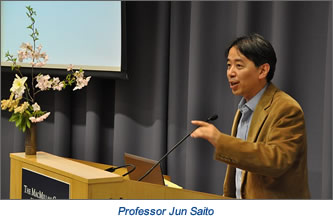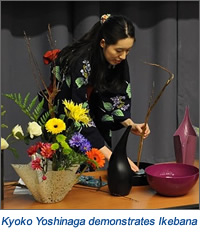In the wake of the devastating March 11, 2011 earthquake and tsunami and the ensuing nuclear crisis in Japan, the Council on East Asian Studies worked closely with the Yale Japanese community, student groups, and other units on campus, to organize several events that examined the impact of the ongoing crises. The events also provided an outlet for the larger community to gather to learn more about Japanese culture and contribute to relief efforts on campus.
 On March 24, more than 150 people gathered at the Loria Center Auditorium for a symposium entitled “Earthquake, Tsunami and Nuclear Crisis: Analyzing Disaster in Japan.” Moderated by Professor Jun Saito (Yale University), the event provided a multidisciplinary approach to understanding the crisis, with presentations by scholars from Yale University, Harvard University, and the University of Tokyo. While the impact of the earthquake and tsunami were discussed, the prospects for rebuilding also were presented because the organizers wanted to stress the hope that remains strong in Japan. Shun-ichiro Karato (Yale University) examined seismological aspects of the earthquake, detection and disaster prevention efforts. The Former Commander of the Self Defense Fleet in Japan, Yoji Koda (Harvard University), discussed the tactical logistics of disaster relief efforts and cooperation between Japan and the United States. Nuclear policy and the unfolding implications of the crisis were presented by Jonathan Schell (Yale University). Yasuhiro Matsuda (University of Tokyo) focused on the implications of the crisis for the future of the Japanese political system. The Former Chair of the Infrastructure Committee in the House of Councilors in Japan, Kotaro Tamura (Harvard University), looked toward the future and presented possibilities for rebuilding Japan.
On March 24, more than 150 people gathered at the Loria Center Auditorium for a symposium entitled “Earthquake, Tsunami and Nuclear Crisis: Analyzing Disaster in Japan.” Moderated by Professor Jun Saito (Yale University), the event provided a multidisciplinary approach to understanding the crisis, with presentations by scholars from Yale University, Harvard University, and the University of Tokyo. While the impact of the earthquake and tsunami were discussed, the prospects for rebuilding also were presented because the organizers wanted to stress the hope that remains strong in Japan. Shun-ichiro Karato (Yale University) examined seismological aspects of the earthquake, detection and disaster prevention efforts. The Former Commander of the Self Defense Fleet in Japan, Yoji Koda (Harvard University), discussed the tactical logistics of disaster relief efforts and cooperation between Japan and the United States. Nuclear policy and the unfolding implications of the crisis were presented by Jonathan Schell (Yale University). Yasuhiro Matsuda (University of Tokyo) focused on the implications of the crisis for the future of the Japanese political system. The Former Chair of the Infrastructure Committee in the House of Councilors in Japan, Kotaro Tamura (Harvard University), looked toward the future and presented possibilities for rebuilding Japan.
The symposium was co-sponsored with the Office of International Affairs, the Office of International Students and Scholars, the MacMillan Center, the Todai-Yale Initiative, the University of Tokyo, and the Japanese American Student Union. Following the symposium, there was a candlelight vigil for victims and their families on Cross Campus that was attended by more than 60 people.
 As part of the larger “Yale for Japan” activities on campus in April 2011, the Council on East Asian Studies co-sponsored a series of lectures by Yale faculty and visiting scholars on Japan’s national security policy, government change, economic policies, and the politics behind the nuclear crisis. Such Japan-related events for the spring term culminated on April 22, when more than 70 people gathered in Luce Auditorium for a “Spring Afternoon with Japanese Tea.” The event was organized in close collaboration with members of the Japanese community as part of “Yale for Japan” efforts in appreciation of the support provided by the community in response to the disaster in Japan. It showcased presentations on Japanese tea by Sadako Ohki (Yale University Art Gallery) and tea house architecture and gardens by Yoko Kawai (Yale School of Architecture). These lectures were followed by a tea ceremony demonstration presented by Keiko Ishibe and Takako Yoshimura in one of the most traditional styles of Japanese tea (Omotesenke). The Japanese art of flower arranging (Ikebana) was demonstrated by Kyoko Yoshinaga (Yale Law School). After the cultural presentations, the audience was able to participate in separate workshops to learn more about the Japanese tea ceremony, calligraphy, and the making of origami cranes.
As part of the larger “Yale for Japan” activities on campus in April 2011, the Council on East Asian Studies co-sponsored a series of lectures by Yale faculty and visiting scholars on Japan’s national security policy, government change, economic policies, and the politics behind the nuclear crisis. Such Japan-related events for the spring term culminated on April 22, when more than 70 people gathered in Luce Auditorium for a “Spring Afternoon with Japanese Tea.” The event was organized in close collaboration with members of the Japanese community as part of “Yale for Japan” efforts in appreciation of the support provided by the community in response to the disaster in Japan. It showcased presentations on Japanese tea by Sadako Ohki (Yale University Art Gallery) and tea house architecture and gardens by Yoko Kawai (Yale School of Architecture). These lectures were followed by a tea ceremony demonstration presented by Keiko Ishibe and Takako Yoshimura in one of the most traditional styles of Japanese tea (Omotesenke). The Japanese art of flower arranging (Ikebana) was demonstrated by Kyoko Yoshinaga (Yale Law School). After the cultural presentations, the audience was able to participate in separate workshops to learn more about the Japanese tea ceremony, calligraphy, and the making of origami cranes.
The Spring Afternoon Tea was organized with a spirit of hope, appreciation, and the strong desire to share Japanese culture with the wider community. Japanese tea and sweets were provided at the event and donations were also collected for disaster relief efforts in Japan.
The event was co-sponsored with the Japan Program of the Department of East Asian Languages and Literatures, the MacMillan Center, the Office of International Affairs, and the Yale University Art Gallery. For more information regarding the ongoing Japan relief efforts at Yale, please visit http://relief.yale.edu/.
